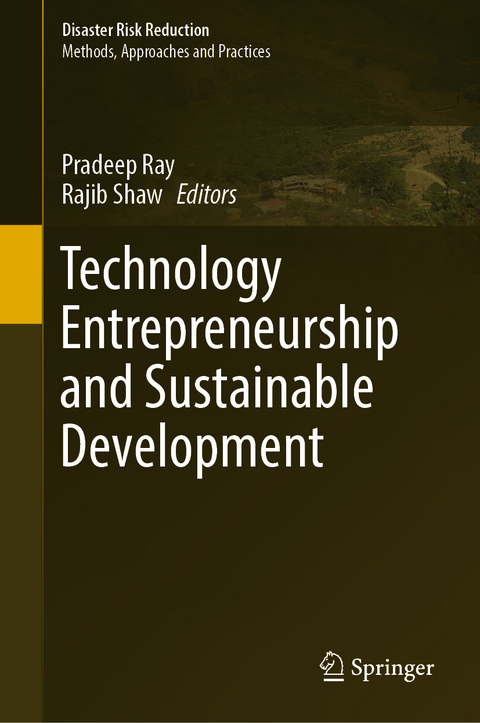
Technology Entrepreneurship and Sustainable Development
Springer Verlag, Singapore
978-981-19-2052-3 (ISBN)
Pradeep Ray is the founder and director of the Center For Entrepreneurship (CFE) at the University of Michigan–Shanghai Jiao Tong University, China. This centre has been a leading international entrepreneurship educational institute in China and Asia through the minor it offers in entrepreneurship for engineering students in collaboration with industry and international organisations, such as the Institute of Electrical and Electronics Engineers (IEEE), partner institutions and the Yunus Centre, Bangladesh. Dr. Ray is currently leading research on social entrepreneurship, including universal healthcare based on UN Sustainability Development Goals (SDGs) through public–private partnerships. He has been leading initiatives on technology entrepreneurship for sustainable development in Asia through collaborative projects on mobile health and healthy ageing involving more than 50 researchers from about 15 countries. These projects led to the edited book Mobile Technologies for DeliveringHealthcare in Remote, Rural or Developing Regions (IET Press, London, 2020) edited by Dr. Ray and others. Previously, he was the founder and director for 10 years at the Asia-Pacific Ubiquitous Healthcare Research Centre (APuHC) of the University of New South Wales (UNSW), Australia, which was designated as a WHO Collaborating Centre on eHealth in 2013. He is the founder of IEEE Healthcom, premier international conferences on eHealth, which have been held annually since 1999. Rajib Shaw is a professor in the Graduate School of Media and Governance in Keio University, Japan. He is also a senior fellow of the Institute of Global Environmental Strategies (IGES) Japan, and the chairperson of the Sustainable Environment and Ecological Development Society (SEEDS) Asia and the Church World Service (CWS) Japan, two Japanese NGOs. He is also a co-founder of a Delhi (India)-based social entrepreneur startup, the Resilience Innovation Knowledge Academy (RIKA). Earlier, hewas the executive director of the Integrated Research on Disaster Risk (IRDR) and was a professor in Kyoto University. His expertise includes disaster governance, community-based disaster risk management, climate change adaptation, urban risk management, and disaster and environmental education. Professor Shaw was the chair of the United Nations Science Technology Advisory Group (STAG) for disaster risk reduction and currently is the co-chair of the Asia Pacific Science Technology Academic Advisory Group (ASTAAG). He is also the coordinating lead author (CLA) for the Asia chapter’s 6th Assessment Report of the Intergovernmental Panel on Climate Change (IPCC). He is the editor-in-chief of the journal Progress in Disaster Science and series editor of a Springer book series on disaster risk reduction. Professor Shaw has published 51 books and over 400 academic papers and book chapters.
Overview of technology entrepreneurship for sustainable development.- Experiential Learning Approaches for Enhancing Development Skills: A Review of the Social Business Canvas as a Pedagogical Tool.- Practicum-oriented Entrepreneurship Education: A Systematic Literature Review.- Applicability of Business Model Canvas in the Context of Entrepreneurship in Asia: A Systematic Literature Review.- Global entrepreneurship sustainability through evolving ecosystems.- Starting up STEAM in China: A Case Study of Technology Entrepreneurship for STEAM Education in China.- Sustainable Societal Development through Holistic Education Programs.- The Role of Technology Entrepreneurship in Facilitating Corporate Donations: A Model for B2B Social e-Business Development.- Harnessing Mobile technologies for Healthy Living: A Case Study on Smoking Cessation.- Linking Climate Action and Sustainable Development Goals by Activating Co-benefits.- Social entrepreneurship and disaster risk reduction- A case of India.- Mapping Water Salinity in Coastal Areas Affected by Rising Sea Level.- Citizen science for Urbanization, Disaster, and Environmental management.- Technology and innovation for societal resilience through multistakeholder collaboration.- Technology entrepreneurship and wildfire risk management.- A sustainable water supply business model by utilization of the innovative water flocculants, A Case Study in Bagamoyo, Tanzania.- Emerging technologies and innovation to reach out to vulnerable populations in Nepal.
| Erscheinungsdatum | 21.06.2022 |
|---|---|
| Reihe/Serie | Disaster Risk Reduction |
| Zusatzinfo | 54 Illustrations, color; 19 Illustrations, black and white; XIV, 342 p. 73 illus., 54 illus. in color. |
| Verlagsort | Singapore |
| Sprache | englisch |
| Maße | 155 x 235 mm |
| Themenwelt | Naturwissenschaften ► Biologie ► Ökologie / Naturschutz |
| Naturwissenschaften ► Geowissenschaften | |
| Sozialwissenschaften ► Politik / Verwaltung | |
| Wirtschaft ► Betriebswirtschaft / Management ► Unternehmensführung / Management | |
| Schlagworte | disaster risk reduction • Entrepreneurship • Environment • sustainable development • Technology |
| ISBN-10 | 981-19-2052-4 / 9811920524 |
| ISBN-13 | 978-981-19-2052-3 / 9789811920523 |
| Zustand | Neuware |
| Haben Sie eine Frage zum Produkt? |
aus dem Bereich


